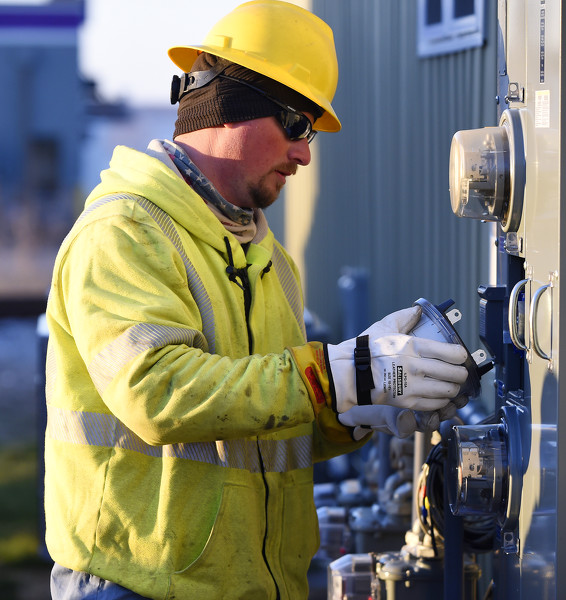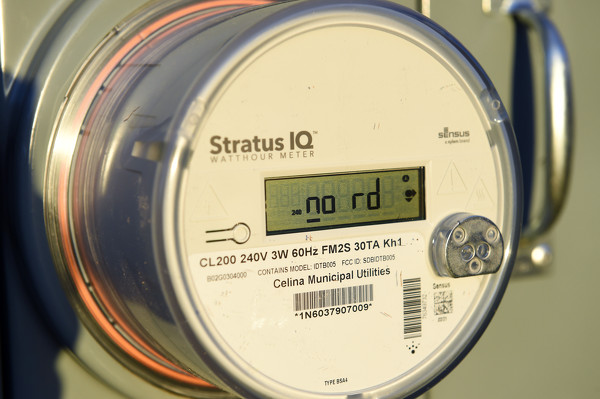Saturday, March 20th, 2021
Socially distanced meters
Federal COVID-19 relief funds used to install new units
By William Kincaid

Photo by Dan Melograna/The Daily Standard
Celina electric employee Bart Leininger installs new radio meters on Friday morning along East Livingston Street. The new meters can be read remotely, eliminating employees' need to access them directly.
CELINA - City utilities crews have begun installing equipment that will allow for remote readings of monthly residential utility use.
The overhaul will cost hundreds of thousands of dollars and take up to a few years to complete. The upgrades will allow meter readers to conduct their work without having to access the water and electricity meters directly, a move that mayor Jeff Hazel said would improve safety, result in more accurate readings and afford more privacy to residents.
"With the radio on there they no longer have to read the meter physically because it's going to automatically download to their handheld devices," Hazel said.
The first round of equipment purchases qualifies for reimbursement with federal COVID-19 relief funds since it permits social distancing, officials have said.
"Certainly the benefit is accuracy, and it will be safety for employees while increasing the privacy of homeowners who have fenced in their backyards, as is their right," Hazel said. "It allows our meter readers to be able to acquire the readings for the electric and water meters without accessing into that backyard area."
The city's customer accounts division employs two full-time and a part-time meter readers who record water, electricity and sewage use. They must physically access each meter. With the remote meters, they'll largely be able to collect data while in the comfort of their vehicles, Hazel said.
"For the most part they should be able to stay in their vehicles," Hazel said. "Maybe an apartment building where it's in, they may have to go out and walk around, but they won't have to go into it and access each one."
As such, meter readers won't be as exposed as often to the elements, confrontational residents or vicious dogs.
Crews will install the remote equipment when they have free time.
"We have a three-man crew. We do this when we don't have other services or repairs to do," water distribution assistant superintendent Jerry Barger said.
Many residential water meters are located in underground water meter pits, Barger said. Employees open the pit and attach a reading gun to the probe wire. Under the new system, a Bluetooth device in the pit will transmit the reading to a handheld device.
"What we have is a radio-read device that sends a Bluetooth signal to the handheld (unit) to make sure that the readings are more accurate and also have less contact with individuals," Barger explained. "We have water meters that are sometimes along the edge of curb and sometimes they may be in somebody's back fence or inside an enclosure that they built around it."
Barger believes the remote meters provide multiple benefits.
"I believe it's going to streamline (the process) because it's going to take the human error out of the reading," Barger said. "It also gives us a chance to be able to analyze a customer's use."
For instance, personnel will be able to detect potential water leaks and notify customers, allowing them to remedy the situation and save money on their water bill.
So far, $327,097 has been spent on the remote equipment, according to Barger.
On the electric side, crews are installing new remote-read meters at residences. The concept is the same, with the meter transmitting the data to handheld devices.
"Eventually down the road we're hoping to have the capabilities of knowing if there's an outage at each specific address," city electric employee Aaron Siefring said.
So far, $351,000 has been spent on the meters and ancillary equipment, according to electric distribution superintendent Mike Mertz.

Photo by Dan Melograna/The Daily Standard
This new radio meter was installed on Friday.
